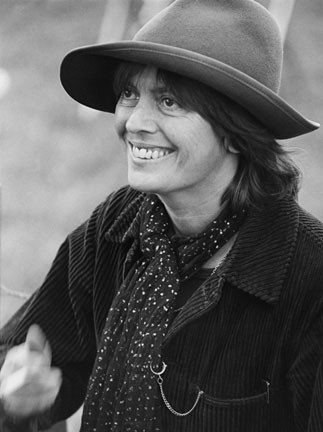

Partner Sande Zeig
Queer Places:
University of California, Berkeley, CA 94720
Vassar College (Seven Sisters), 124 Raymond Ave, Poughkeepsie, NY 12604
 Monique
Wittig (July 13, 1935 – January 3, 2003) was a French author and feminist
theorist[1]
who wrote about overcoming socially enforced gender roles and who coined the
phrase "heterosexual contract". She published her first novel, L'Opoponax,
in 1964. Her second novel, Les Guérillères (1969), was a landmark in
lesbian feminism.[2]
Monique
Wittig (July 13, 1935 – January 3, 2003) was a French author and feminist
theorist[1]
who wrote about overcoming socially enforced gender roles and who coined the
phrase "heterosexual contract". She published her first novel, L'Opoponax,
in 1964. Her second novel, Les Guérillères (1969), was a landmark in
lesbian feminism.[2]
Monique Wittig was born in 1935 in Dannemarie in Haut-Rhin, France. In 1950 she moved to Paris to study at the Sorbonne. In 1964 she published her first novel, L'Opoponax which won her immediate attention in France. After the novel was translated into English, Wittig achieved international recognition. She was one of the founders of the Mouvement de libération des femmes (MLF) (Women's Liberation Movement). In 1969 she published what is arguably her most influential work, Les Guérillères, which is today considered a revolutionary and controversial source for feminist and lesbian thinkers around the world. Its publication is also considered to be the founding event of French feminism.[3][4]
Wittig earned her Ph.D. from the Ecole des Hautes Etudes en Sciences Sociales,[1] after completing a thesis titled "Le Chantier littéraire".[5] Wittig was a central figure in lesbian and feminist movements in France. In 1971, she was a founding member of the Gouines rouges ("Red dykes"), the first lesbian group in Paris.[3] She was also involved in the Féministes Révolutionnaires ("Revolutionary feminists"), a radical feminist group.[3] She published various other works, some of which include the 1973 Le Corps lesbien (or The Lesbian Body) and the 1976 Brouillon pour un dictionnaire des amantes (or Lesbian Peoples: Material for a Dictionary), which her partner, Sande Zeig, coauthored.
In 1976 Wittig and Zeig moved to the United States where Wittig focused on producing work of gender theory. Her works, ranging from the philosophical essay The Straight Mind to parables such as Les Tchiches et les Tchouches, explored the interconnectedness and intersection of lesbianism, feminism, and literary form. With various editorial positions both in France and in the United States, Wittig's works became internationally recognized and were commonly published in both French and English. She continued to work as a visiting professor in various universities across the nation, including the University of California, Berkeley, Vassar College and the University of Arizona in Tucson. She taught a course in Materialist Thought through Women's Studies programs, wherein her students were immersed in the process of correcting the American translation of The Lesbian Body. She died of a heart attack on January 3, 2003.[1]
My published books: